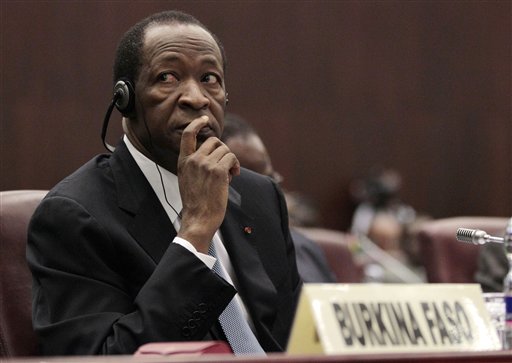
This is a Wednesday, June 29, 2011 file photo of Burkina Faso President Blaise Compaore listens during a session on peer review amongst African leaders, at the Sipopo conference center, outside Malabo, Equatorial Guinea. Compaore stepped down Friday Oct. 31, 2014 after 27 years in power and said elections would be held in 90 days following a wave of protests against his rule. AP
OUAGADOUGOU, Burkina Faso — President Blaise Compaore stepped down Friday after 27 years in power following a wave of protests against his rule.
“I declare that I’m leaving power in order to have a free and transparent election in 90 days,” said Compaore in a statement read out on television and radio stations. “For my part, I think I have fulfilled my duty.”
Opposition protesters gathered in a square in the capital burst into cheers when they heard the announcement on hand-held radios.
A car burns outside the parliament building in Burkina Faso as people protest against their longtime president Blaise Compaore who is seeking another term in Ouagadougou, Burkina Faso, Thursday, Oct. 30, 2014. AP
Compaore, 63, said he decided to leave power “in light of the severely deteriorated sociopolitical situation and the threat of division in our national army and out of a desire to preserve the peace.”
It is believed that the prime minister will take power, as Compaore referred to the constitution which says that is who should succeed. However the military has played a visible role during this crisis and Burkina Faso’s government and parliament were dissolved on Thursday.
For months, an opposition coalition has been urging Compaore not to seek re-election for what would have been his fifth term in power. But Compaore and his ruling party looked set to push a bill through parliament on Thursday that would have allowed him to run again.
Determined to block the vote, protesters stormed the building, the vote was suspended and the military announced the legislature had been dissolved and a transition government would be formed. After that Compaore said he would lead until the new elections.
But protesters rejected that plan and gathered again Friday, demanding that Compaore step down immediately.
It was a dramatic turn of events for one of Africa’s longest serving leaders who has survived other attempts to topple him.
Compaore first came to power following the October 1987 coup against then-President Thomas Sankara, Compaore’s longtime friend and political ally who was killed in the power grab.
In this photo taken Thursday, Oct. 30, 2014, protesters shout out as they go on a rampage near the parliament building in Burkina Faso as people protest against their longtime President Blaise Compaore who seeks another term, in Ouagadougou, Burkina Faso. AP
Compaore was elected four times since, though the opposition has disputed the results.
In recent years, he has fashioned himself as an elder statesman who brokered electoral disputes and hostage releases throughout West Africa. Domestically he kept a tight leash on any opposition and never groomed a viable political heir.
In 2011, Compaore was confronted by an earlier challenge when multiple waves of protests washed over the country. At one point, mutinous soldiers occupied the palace, forcing Compaore to flee.
But what would have spelled the end for many presidents was a mere temporary problem for Compaore and he maneuvered to stay in power by removing his security chiefs and appointing himself defense minister before returning to Ouagadougou.